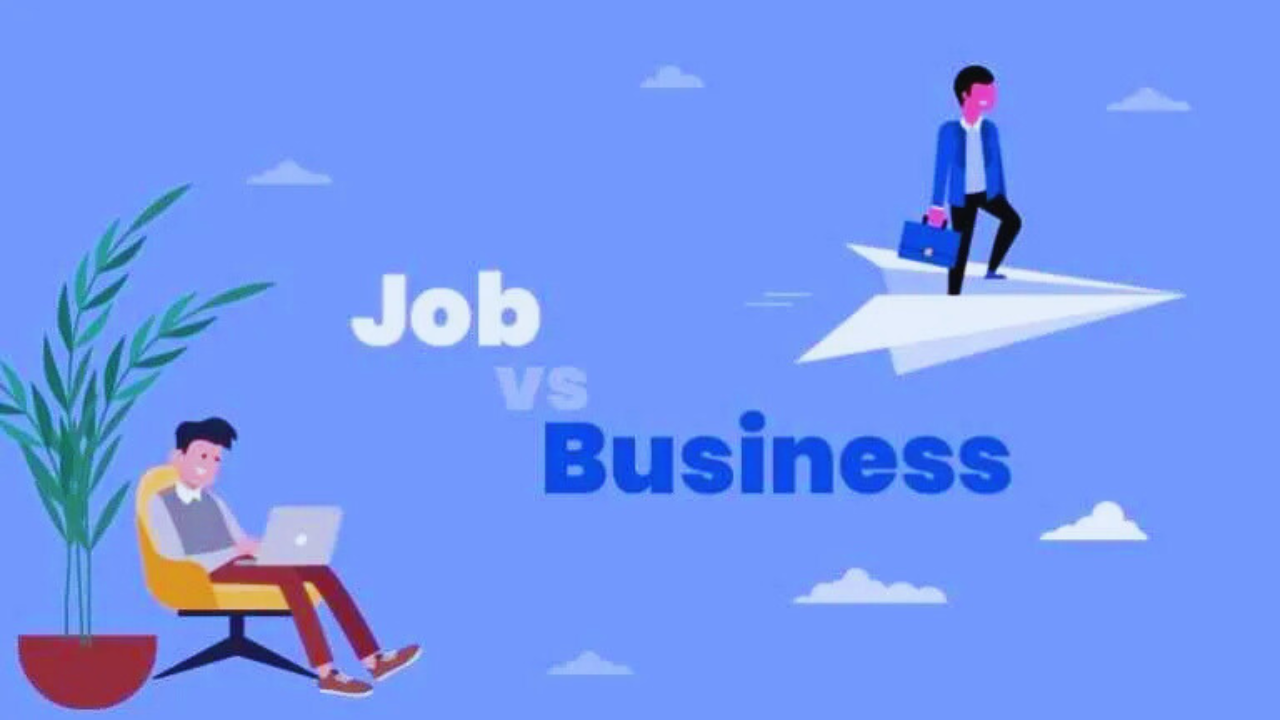Business is one of the most crucial decisions individuals face. As we move into 2025, advancements in technology, the global economy, and emerging business models are significantly reshaping how we work and succeed. The rise of automation, artificial intelligence, and digital platforms is making traditional career paths less predictable while opening up new entrepreneurial opportunities.
For those considering their future, the choice between a job and starting a business comes with both advantages and challenges. A stable job offers financial security and benefits, whereas entrepreneurship brings the potential for greater financial freedom, but with higher risks and uncertainties. Understanding these dynamics and assessing your personal goals, resources, and adaptability to change can help you determine the best route to achieve long-term success.
Job and Business Paths
a person’s career path can generally be classified into two broad categories: a job or a business. Both options present distinct opportunities, challenges, and rewards. Choosing the right path often depends on individual preferences, lifestyle aspirations, and long-term goals. For some, a traditional job provides the stability and benefits necessary for a fulfilling life, while others may be drawn to the independence and potential rewards of running their own business.
A job often provides a structured work environment, regular income, and various employee benefits such as health insurance, retirement plans, and paid leave. These advantages appeal to those who seek stability, a clear career progression, and a work-life balance that doesn’t require extra risk. The tradeoff, however, can be a lack of control over your work schedule, potential limitations on earning potential, and fewer opportunities for creative freedom.
On the other hand, starting a business can offer unlimited growth potential, autonomy, and the ability to directly reap the rewards of your efforts. Entrepreneurs are driven by the desire to innovate, create something of their own, and take on challenges that allow them to shape their destiny. However, it also comes with inherent risks, including financial uncertainty, the pressure of responsibility, and the constant need for adaptation to market trends. For those willing to take on these challenges, owning a business can lead to significant personal and financial success, but it requires resilience, strategic thinking, and risk tolerance.
The Traditional Job Path
Choosing a traditional job path offers financial stability and a predictable routine. Employees typically benefit from a steady paycheck, healthcare benefits, and retirement plans. This path is ideal for those who prefer a structured work environment, regular hours, and job security. Additionally, a job provides opportunities for career advancement within an established organization, fostering skill development and professional growth. However, some individuals may feel limited by the lack of autonomy and creative freedom in their roles.
The Entrepreneurial Journey
Starting a business offers entrepreneurs a high level of independence and the potential for substantial financial rewards. Unlike jobs, entrepreneurship allows individuals to set their schedules, decide on business strategies, and pursue their passions. Although the journey can be risky, it provides unmatched freedom in terms of creativity and growth potential. Entrepreneurs also can scale their businesses, increase their income, and create their own work culture. However, the challenges of managing finances, and clients, and the unpredictability of market trends can be overwhelming.
Job Stability vs Business Flexibility
Jobs offer a level of stability that many people find appealing, especially in uncertain economic climates. Regular paychecks and employee benefits provide a safety net, making jobs ideal for individuals who prioritize financial security and a work-life balance. In contrast, owning a business may offer flexibility, allowing entrepreneurs to work from anywhere, set their hours, and build a work environment that suits their lifestyle. However, the trade-off is the lack of guaranteed income and the constant pressure of making business decisions that directly impact success.
Financial Considerations: Job Security vs Entrepreneurial Investment
job, individuals can rely on their employer for financial support, with salary increases and bonus structures often tied to performance or company growth. Many employees also enjoy job-related perks, such as paid time off, which provide a level of comfort and security. On the other hand, entrepreneurs face the challenge of funding their business ventures, often requiring significant personal investment, loans, or outside capital. While the potential for higher earnings exists, business owners must navigate financial uncertainty, particularly in the early stages.
Career Growth Opportunities in Jobs vs. Business Expansion
Jobs typically offer a clear path for professional growth, with opportunities to move up within the organization. Employees can gain new skills through training, promotions, and mentorship from higher-ups. However, advancement can sometimes be slow and dependent on organizational structure or external factors. In contrast, entrepreneurship allows for rapid growth through business expansion, innovation, and reinvestment. Business owners have the potential to scale their operations, hire employees, and diversify their services, enabling them to reach new markets and increase profitability.
Work-Life Balance: Jobs vs. Business Ownership
For many, a job offers a better work-life balance, as employees are typically able to leave their work behind at the end of the day. The structure of a traditional job allows individuals to maintain personal time, pursue hobbies, and spend time with family. Entrepreneurs, on the other hand, may struggle to find this balance due to the constant demands of running a business. Business owners often work long hours, including nights and weekends, especially in the early stages when the business is still growing. This can lead to burnout if not managed carefully.
Risk and Reward: Jobs Offer Less Risk, But Limited Rewards
Jobs come with less risk because employees are not responsible for the financial health of the organization. Their primary concern is performing their duties, and they are compensated based on the agreed-upon salary. However, the potential for high financial rewards is limited compared to owning a business. Entrepreneurs take on more risks, including personal and financial responsibilities. While they face the possibility of failure, the rewards for success can be substantial, both financially and personally. A successful business can offer long-term wealth, while a job typically has a capped income potential.
Personal Fulfillment: Passion vs Security
employees may find fulfillment in their work if they align with the company’s values and goals, or by advancing through the ranks. However, some may feel disconnected or unchallenged by their roles, especially if there is a lack of creativity or personal connection to the work. Entrepreneurs, on the other hand, often start businesses based on their passions and interests, which can lead to a high level of personal fulfillment. The drive to create something meaningful can provide a sense of purpose and satisfaction that is hard to replicate in a traditional job setting.
Comparison: Job vs Business
| Aspect | Job | Business |
| Stability | High level of stability with a regular income | Low stability, income depends on business performance |
| Risk | Low risk, especially in established industries | High risk, with the possibility of failure |
| Time Commitment | Fixed working hours | Flexible but often demanding, especially in the early stages |
| Income Potential | Limited, with salary increases over time | High potential, but variable and depends on business success |
| Work-Life Balance | Predictable and structured hours | Can be erratic, often requiring more personal sacrifice |
| Skill Development | Focused on specific roles and tasks | Requires a broad skill set, including management, marketing, and finance |
| Control Over Career | Limited control, based on employer’s decisions | Full control over business direction and growth |
Why the Job Path Works for Some People
Many individuals opt for jobs due to the stability and security they offer. A traditional job provides a regular paycheck, health benefits, retirement plans, and the predictability that many find appealing. This route can be particularly attractive for those who value work-life balance and prefer not to take on the risks associated with business ownership. With clear expectations and limited responsibility for external factors, jobs allow employees to focus on their roles without the added stress of financial management, marketing, or client acquisition.
For people who prefer structure and less uncertainty, the job path can be the ideal option. The security and benefits provided by an employer create a reliable and relatively stress-free environment, allowing individuals to thrive without the constant worry that comes with running a business. This career choice is particularly attractive for those who want stability, personal time, and the comfort of knowing they are part of a well-established organization.
Benefits of a Job
- Job Security: One of the most significant benefits of a job is job security. Many well-established companies offer long-term employment opportunities, which can be especially appealing during uncertain economic times. Employees may benefit from long-term contracts, severance packages, and pension plans, offering peace of mind that, in the event of job loss or a downturn, they will have financial backup. This sense of security is often a strong motivating factor for individuals seeking stable employment.
- Work-Life Balance: A major advantage of having a job is the predictable work hours that come with it. Employees typically know when they are expected to work, which helps them plan personal activities, family time, and other commitments. This structured environment is perfect for those who value maintaining a healthy work-life balance and prefer a more consistent routine. By having weekends and evenings free from work demands, individuals can enjoy a sense of stability and time away from the office.
- Defined Career Path: Many jobs offer employees a clear career progression, which can be motivating for individuals who seek growth and advancement. From junior roles to senior positions, there is often a structured ladder to climb, with defined milestones, promotions, and skill development along the way. For individuals who appreciate a clear path and measurable goals, jobs offer the opportunity to build expertise, gain experience, and rise within a company or industry.
- Steady Income: Jobs provide a fixed salary, which offers financial predictability. Having a steady paycheck allows individuals to budget, save, and plan for long-term financial goals with confidence. This can be especially comforting for those with dependents, long-term obligations, or financial goals that require consistent income. Knowing exactly how much money will be earned each month makes it easier to manage expenses and maintain a stable lifestyle.
- Skill Development: In a traditional job, employees often focus on specific tasks and roles, allowing them to develop deep expertise in particular areas. For those who enjoy mastering a particular skill or discipline, jobs offer the chance to become highly proficient. Whether it’s in management, IT, marketing, or finance, employees can hone their skills through on-the-job training, professional development opportunities, and mentorship from experienced colleagues. This specialized knowledge not only increases their value within the company but also enhances their overall career prospects.
Challenges of a Job
While jobs provide many benefits, they also come with certain challenges that may not suit everyone’s career aspirations. For individuals who seek more control, flexibility, and potential for unlimited growth, the traditional job path may feel restrictive. Understanding these challenges is essential when considering whether a job is the right career choice.
- Limited Growth Potential: One of the most common frustrations for employees is the limited growth potential within a job. Many organizations have fixed salary structures and defined career ladders, meaning that pay raises and promotions are often incremental and tied to predetermined timelines or corporate structures. For those with entrepreneurial ambitions or a desire to rapidly increase their income, this slow pace of career advancement can feel limiting. Employees may feel stuck in their roles, with limited opportunities to take on new responsibilities or expand their skills beyond a specific area.
- Lack of Flexibility: Jobs often come with rigid working hours, which can be restrictive for individuals who prefer more autonomy over their schedules. Employees must adhere to office hours, commuting times, and policies dictated by the employer. This lack of flexibility can make it difficult to balance personal commitments, pursue hobbies, or attend to family matters. For those who value the freedom to choose when and where they work, a traditional job can feel confining. The ability to set one’s schedule is a key attraction of entrepreneurship or freelance work, but it is often missing from most jobs.
- Dependence on Employer: Job security is a significant concern for many employees, as it is often not guaranteed. Layoffs, downsizing, or company closures can impact individuals unexpectedly, leaving them without income and potentially scrambling to find new employment. This dependence on an employer for job stability can create a sense of vulnerability, particularly during times of economic uncertainty or industry disruption. While certain roles may offer more security, the overall risk of job loss remains a concern, and employees may feel that they have little control over their long-term career trajectory.
The Appeal of Entrepreneurship and Owning a Business
Starting a business offers a unique set of opportunities that are very different from the typical job experience. Entrepreneurship provides the freedom to follow one’s passions, build something from the ground up, and operate on their terms. In 2025, the rise of e-commerce, technology, and digital platforms has made it easier than ever for individuals to launch businesses, even from the comfort of their homes. This shift has opened up avenues for aspiring entrepreneurs to tap into global markets, leverage digital tools, and create businesses with lower startup costs than in the past. With the right vision and strategy, the potential for success is vast.
While owning a business comes with its own set of challenges, the benefits are often appealing to those who crave autonomy and the opportunity to make a meaningful impact. Entrepreneurs have the chance to create innovative solutions, solve problems, and reach audiences directly. The entrepreneurial path is not for everyone, but for those with a strong sense of purpose and a willingness to take risks, it offers a rewarding career option with limitless potential for growth and achievement.
Control and Independence
One of the greatest advantages of owning a business is the level of control it offers. Entrepreneurs make the decisions, set the direction of the company, and oversee all aspects of operations. This independence allows them to create a business that aligns with their values, vision, and goals. Business owners have the freedom to adjust strategies, try new approaches, and innovate without needing approval from higher-ups. For many, this level of control is deeply fulfilling as it provides the opportunity to carve out their path and build something truly their own.
Unlimited Earning Potential
Unlike jobs with fixed salaries, businesses have the potential to scale exponentially. With the right products, services, and strategies in place, entrepreneurs can grow their businesses and increase revenue in ways that are not possible in traditional employment. As a business expands, so do the profit opportunities, creating the possibility of substantial financial rewards. Successful entrepreneurs often earn far more than they would in a job, especially if they can create a scalable model, develop multiple income streams, or build a brand that attracts significant customer demand.
Passion and Purpose
Many entrepreneurs choose to start a business because it allows them to turn their passions into a career. Whether it’s a love for technology, fashion, health, or education, owning a business allows individuals to work on projects they care about deeply. This connection to their work provides a sense of fulfillment that is often missing in traditional jobs. Entrepreneurs frequently cite the satisfaction of making a difference, solving real problems, or bringing a personal vision to life as key reasons why they are motivated to build and run their businesses.
Flexibility
Business owners have the advantage of setting their schedules, which offers flexibility in how they balance work and life. Unlike traditional jobs with fixed hours, entrepreneurs can choose when to work, when to rest, and how to structure their days. This level of flexibility is especially appealing to those who value work-life harmony or have personal commitments they want to prioritize. The ability to work from home, travel, or implement flexible hours is often a significant draw for many people who pursue entrepreneurship.
Personal Growth
Running a business demands that entrepreneurs wear many hats. They are responsible for everything from product development and marketing to finances and customer service. This broad range of responsibilities leads to accelerated personal and professional growth. Entrepreneurs develop diverse skill sets, learning about finance, marketing, management, and leadership. This constant learning curve can be incredibly rewarding as it pushes individuals to expand their knowledge, adapt to challenges, and grow both as business leaders and individuals.
Tabular Comparison: Jobs vs Business
| Feature | Job | Business |
| Risk Level | Low to Moderate | High |
| Control Over Schedule | Limited, fixed hours | High, flexible |
| Income Potential | Predictable, but capped | High, but variable |
| Workload | Fixed, less demanding | Can be intense, especially early on |
| Career Progression | Structured and set by employers | Self-determined, depending on business success |
| Job Satisfaction | Varies depending on role and company | Can be high, depending on business goals and achievements |
Which Path Is Right for You in 2025?
Choosing between a job and a business in 2025 depends on several personal factors, and the decision is highly individual. It’s essential to evaluate your priorities, risk tolerance, and long-term goals when making this choice. Consider whether you value the stability and predictability of a job, or if you’re more drawn to the freedom and growth potential of entrepreneurship. Your financial situation, lifestyle aspirations, and personal circumstances also play a significant role in determining which path aligns best with your needs.
Key considerations include your passion, ability to handle uncertainty, and whether you have the necessary resources to support a business venture. Additionally, think about your work-life balance preferences, as jobs often offer more structure, while businesses may require longer hours but offer more flexibility. Assessing these factors can help you make a more informed decision, setting you up for a successful and fulfilling career path in 2025.
Risk Tolerance
A major factor in deciding between a job and a business is your level of risk tolerance. A job generally offers more security and stability with a predictable income, health benefits, and retirement plans. This can be appealing if you prefer a safer, more stable career path, particularly in uncertain economic times. On the other hand, entrepreneurship involves significant risk. Business owners often face uncertainty, and income can be irregular, especially in the initial stages. However, the potential rewards, including financial freedom and autonomy, can make the risk worthwhile for those who are comfortable with it.
Financial Considerations
Your financial situation will play a significant role in determining which path is more feasible for you. Starting a business typically requires capital for initial investments, such as equipment, marketing, and operations. If you don’t have access to substantial funding or prefer not to take on debt, a job might be a safer choice initially. However, as businesses grow, there is potential for significant returns, while jobs may offer capped salary increases. Assess your savings, potential income, and whether you’re ready to take financial risks before venturing into entrepreneurship.
Passion and Purpose
If you’re deeply passionate about a particular field or have an entrepreneurial spirit, starting your own business could be a fulfilling path. Entrepreneurship allows you to turn your passions into your profession, working on something you care about deeply. In contrast, many jobs are more focused on executing tasks within a set framework, which may not provide the same level of personal fulfillment. Consider what drives you—whether it’s the security and structure of a job or the creative freedom and potential impact of owning a business.
Work-Life Balance
Another critical consideration is your desired work-life balance. Jobs typically have set working hours, which allows for predictability and the ability to plan personal activities. This structure is ideal for individuals who prefer a more balanced life, where work doesn’t overflow into personal time. However, owning a business requires more flexibility and time management. Entrepreneurs often work long hours, especially in the early stages, and may need to juggle multiple responsibilities. This can lead to less predictable time off, though it offers the freedom to set your schedule once the business is established.
Career Progression
In a job, career progression is typically structured and defined. You can see the steps for promotion, salary increases, and opportunities for growth within a company. For those who value a clear path forward and enjoy working within an established framework, a job may be the best option. Business ownership, however, offers unlimited growth potential, as there are no preset limits to how much you can earn or how big your business can become. However, this growth is dependent on your efforts and business strategy, and it requires a high degree of initiative, learning, and self-discipline.
Skillset and Personal Growth
Your skill set and desire for personal development also impact your decision. Jobs often provide specialized roles where you can hone expertise in a specific area, but the scope of learning may be limited by the nature of the job. Business ownership, however, forces you to wear many hats, learning about finances, marketing, management, and other key aspects of business operation. This constant learning can accelerate personal growth, but it can also be overwhelming and challenging, especially for those new to entrepreneurship.
Flexibility and Control
Entrepreneurship provides a high degree of control and flexibility. As a business owner, you decide on the vision, goals, and strategies for your company. This level of control allows for a deeper sense of ownership and fulfillment in the work you do. On the other hand, jobs often involve adhering to company policies, and goals set by supervisors, and following a more structured routine. If you value independence and want to forge your path, business ownership can be highly rewarding. However, if you prefer structure and the comfort of clear expectations, a job may offer more stability.
Job Security vs. Business Stability
Job security is a significant draw for many individuals, especially in times of economic uncertainty. Established companies often provide long-term contracts, benefits, and severance packages in case of layoffs, giving employees a sense of financial safety. In contrast, businesses, particularly startups, face greater instability. They are subject to market conditions, competition, and changing consumer behavior. While some businesses thrive and become highly profitable, many struggle to stay afloat, especially in the beginning. It’s important to weigh the trade-off between job security and the unpredictability of business success.
Long-Term Goals
Your long-term goals are essential when deciding between a job and a business. Are you aiming for long-term stability, career growth, and a structured retirement plan? A job may be the right path for you. However, if your goals include building wealth, achieving financial independence, and potentially leaving a legacy, business ownership can offer more opportunities to achieve these aspirations. Entrepreneurs have the potential to scale their businesses, create multiple revenue streams, and possibly exit with a large payout, something that’s harder to achieve in a traditional job.
Readiness to Learn and Adapt
The world of business is constantly evolving, especially with the rise of digital platforms, e-commerce, and emerging technologies. Entrepreneurs must be willing to continuously learn, adapt, and innovate to stay competitive. If you’re the type of person who enjoys learning new skills, problem-solving, and navigating through changing markets, entrepreneurship might be a good fit for you. On the other hand, if you prefer working within established frameworks and minimizing risk, a job may provide the stability you seek while still allowing you to contribute meaningfully to an organization.
Wrapping Up
Ultimately, the choice between a job and a business is a deeply personal decision, shaped by several factors, including your risk tolerance, financial situation, desired work-life balance, and long-term goals. While a job offers stability, predictable income, and a clear career path, entrepreneurship provides freedom, independence, and the opportunity for significant financial rewards. Each option has its own set of benefits and challenges, and determining which one is the right fit depends on your individual preferences and aspirations.
Both paths offer unique opportunities in an ever-changing world driven by technology and innovation. Regardless of the route you take, success hinges on your ability to adapt, embrace continuous learning, and align your choices with your core values. Whether you choose the security of a job or the excitement of entrepreneurship, staying flexible and focused on your goals will be key to thriving in this dynamic environment.
FAQs
What are the key differences between jobs and businesses?
The key differences between jobs and businesses lie in control, income potential, and risk. Jobs typically offer stability, a fixed salary, and defined working hours, but with limited growth. Businesses, however, provide the opportunity for higher earnings, greater flexibility, and full control but come with higher risk, uncertainty, and long working hours.
Can a job provide long-term financial security?
Yes, jobs can offer long-term financial security, especially in well-established industries with stable companies. Benefits like retirement plans, health insurance, and severance packages also add a layer of security, making jobs attractive to those seeking stability.
Is starting a business more risky than having a job?
Yes, starting a business is generally riskier than having a job. Entrepreneurs face the uncertainty of fluctuating income, competition, and market challenges. However, with risk comes the potential for higher rewards, and the possibility of creating something meaningful.
How does the flexibility of business compare to a job?
Business ownership offers greater flexibility in terms of working hours and decision-making. Entrepreneurs have the freedom to set their schedules and make independent choices. In contrast, jobs usually have fixed hours and less autonomy.
Can I have a successful career in both a job and a business?
Yes, many people successfully juggle both by starting a side business while working a full-time job. However, balancing both requires excellent time management, dedication, and the ability to manage multiple responsibilities.
What kind of skills are required for business ownership?
Business owners need a diverse skill set, including financial management, marketing, sales, leadership, and problem-solving. They must also be adaptable and capable of handling the challenges that come with entrepreneurship.
How do I decide between a job and a business in 2025?
To decide between a job and a business, evaluate your financial situation, risk tolerance, career goals, and personal preferences. If stability and work-life balance are your priorities, a job might be the better option. However, if you’re willing to take risks and pursue greater rewards, starting a business could be the right choice.










